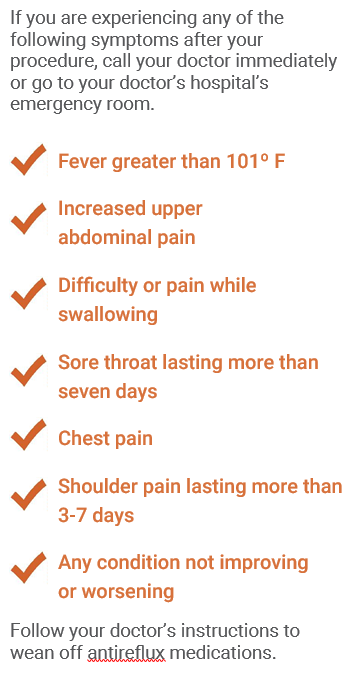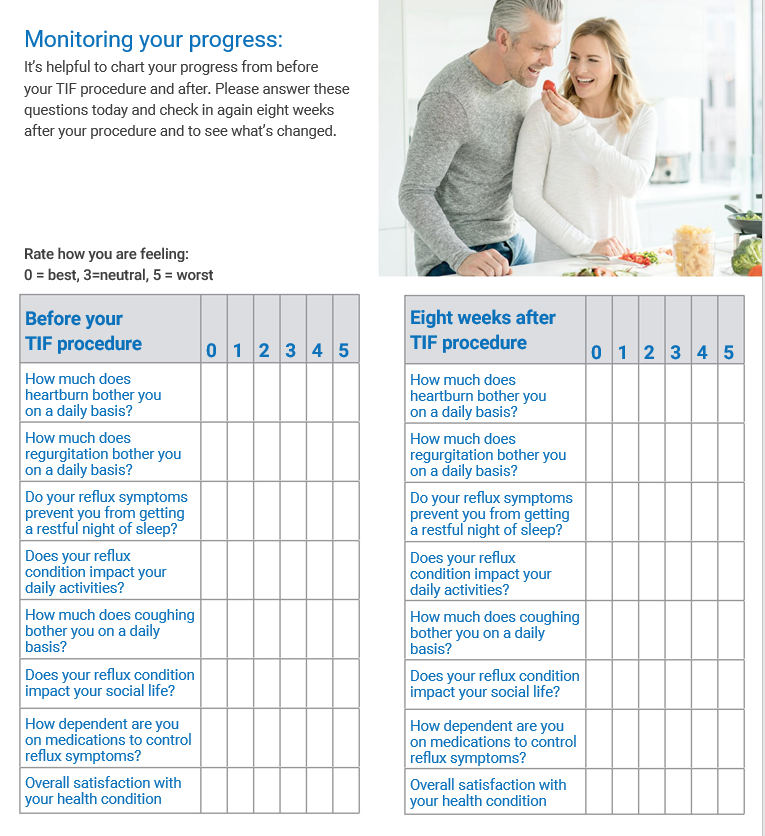TIF Procedure - Post Procedure Patient Instructions
Post-Procedure Instructions
Your doctor will determine whether it is necessary for you to spend the night in the hospital after your procedure. For the first few days, you will experience some pain and/or discomfort in your chest and shoulder and may have a sore throat, and/or some discomfort swallowing. These symptoms should resolve within the first week after your procedure and appropriate medication will be provided as needed. If symptoms do not resolve or if discomfort becomes more severe, notify your doctor immediately.
Continue to take your GERD medication after your procedure as recommended by your doctor.
Occasionally heartburn is normal in healthy people and may depend on diet and other factors such as stress. If GERD symptoms recur, you should contact your doctor.
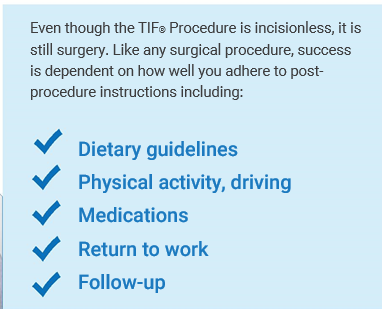
Dietary Guidelines
The strength of your new antireflux valve is largely determined by how well it heals. What you eat and drink can dramatically impact the durability of your antireflux valve. You will be asked to follow a liquid diet followed by a mashed and soft food diet as your newly reconstructed valve heals.
If you experience heartburn, write down the food that gave you heartburn and avoid eating it. Talk to your doctor at your next visit about your food-associated symptoms. Remember, its normal for some people (non-CERD patients) to occasionally experience heartburn from specific foods, and this may mean that your valve is functioning correctly. If your symptoms persist, contact your doctor immediately.
During the 6-week post-procedure period, it's important that you adhere to the following guidelines:
- Eat 4 to 5 small meals consisting of soft foods throughout the day.
- Take small bites and chew your food thoroughly for 30 seconds to avoid swallowing a large bolus of food.
- Avoid foods with coarse texture: nut, raw fruits, and raw vegetables.
- Try not to vomit, cough, retch, or strain. This can significantly affect the healing and effectiveness of your new antireflux valve.
- During the healing process, avoid foods and drinks that triggered your reflux in the past. You may reintroduce them slowly after healing.
- To avoid chest pain take small bites, chew for 30 seconds and gradually thicken the texture of your food.
- Remain in an upright position for 1 hour after eating.
- Do not eat for at least 2 hours before bedtime.
- Do not drink carbonated beverages or alcohol.
- Avoid spicy foods.
- Avoid foods and drinks that are very hot or very cold.
- Follow your doctor's instructions to wean yourself off anitreflux medications.
- Do not smoke.
- Avoid gas-forming, acid producing foods, or foods that slow gastric emptying such as tomato-based products, peppermint, black pepper, caffeinated drinks, alcohol, onions, green peppers, fatty foods, beans, spicy foods, citrus fruits, and fiber supplements.
- Taking over the counter anti-gas medications may be helpful.

The first 2 weeks after your procedure are extremely important. That's why we ask you to be particularly cautious with your diet.
You will stay on clear liquids for the first 1-3 days after your TIF procedure. This diet contains only fluids that are clear and very low in sugar. However, it is not nutritionally balanced and will only be used a few days.
Avoid beverages with alcohol, caffeine, carbonation (soft drink), or acidic drinks (tomato, grapefruit, and orange juice).
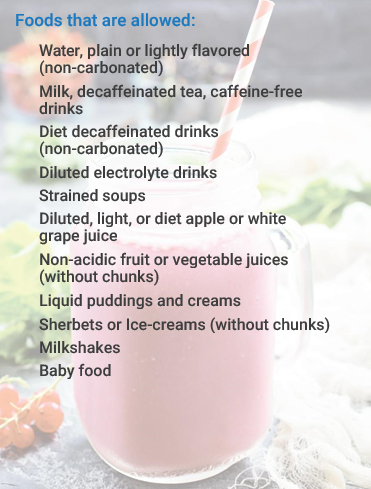
Be sure to drink a minimum fo 4-8 oz of water between each meal.
Do not take large gulps. Sip clear liquids and rest between sips. Allow 20 minutes to drink 1/2 cup. You may sip on fluids all day if you wish but at least 6-8 times per day.
Take your prescribed medications. PPIs should be taken for at least 2 weeks and wean off according to physician recommendation. If pills/capsules are larger than a peanut, discuss with your pharmacist if they can be halved, crushed, or if there are liquid options available to minimize hard swallowing.
Take vitamin/mineral supplements every day being mindful of pill/capsule size as noted above. This will help prevent vitamin and mineral deficiencies.
It's helpful to eat a very low fat diet to minimize heartburn symptoms.
Restaurant foods are not recommended during the first few weeks.
The following protein supplements can be used starting on day 4:
- Protein-enriched commercially available shakes
- You can also add one scoop of concentrated protein powder to your bowl of soup or glass of juice.
During week 2, a liquid diet is still recommended but you may add very liquid, potato-based and non-stringy vegetable mashes.
This diet consists of high-protein full liquids and blended solids. The portions should remain small and not exceed 1/2 cup to help prevent vomiting and proper healing of your newly reconstructed valve.
Your meals will be only liquid or blended. They may include milk, vegetable or diluted fruit juice. Sip liquid meals very slowly. Drink 4 oz (1/2 cup) over 20-30 minutes.
Eat 4-6 small meals each day. The amount you will be able to eat at one time is very small and should not exceed 1/2 cup. Eat foods high in protein because they help your body heal from surgery.
Tips on how to blend foods:
- Cut foods into small pieces
- Place food into blender or food processor
- Add liquid such as broth, juice, or milk
- Blend or puree until smooth
- Strain foods that do not blend in a completely smooth consistency
- Season foods to taste
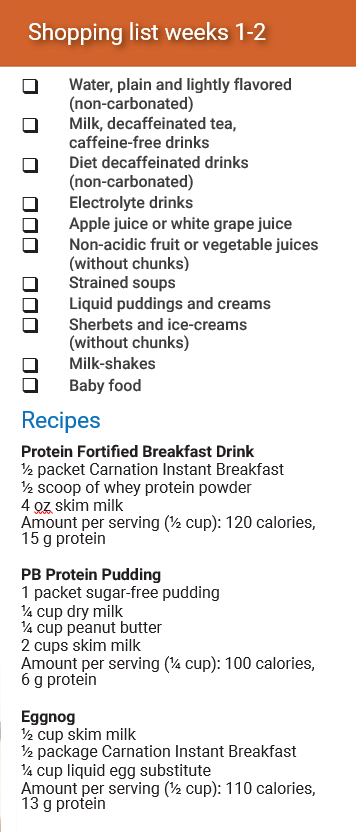
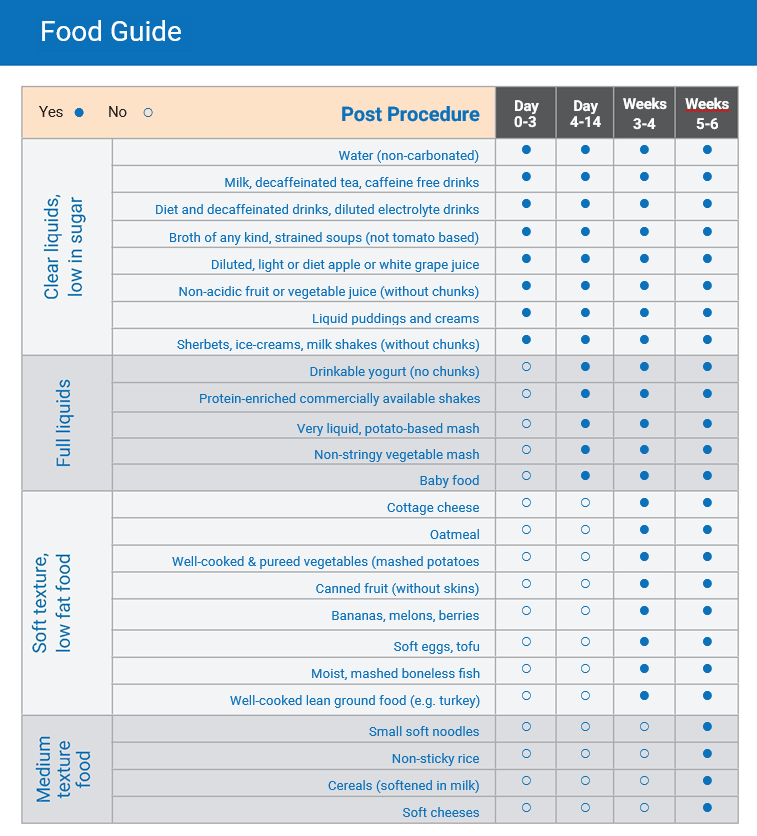
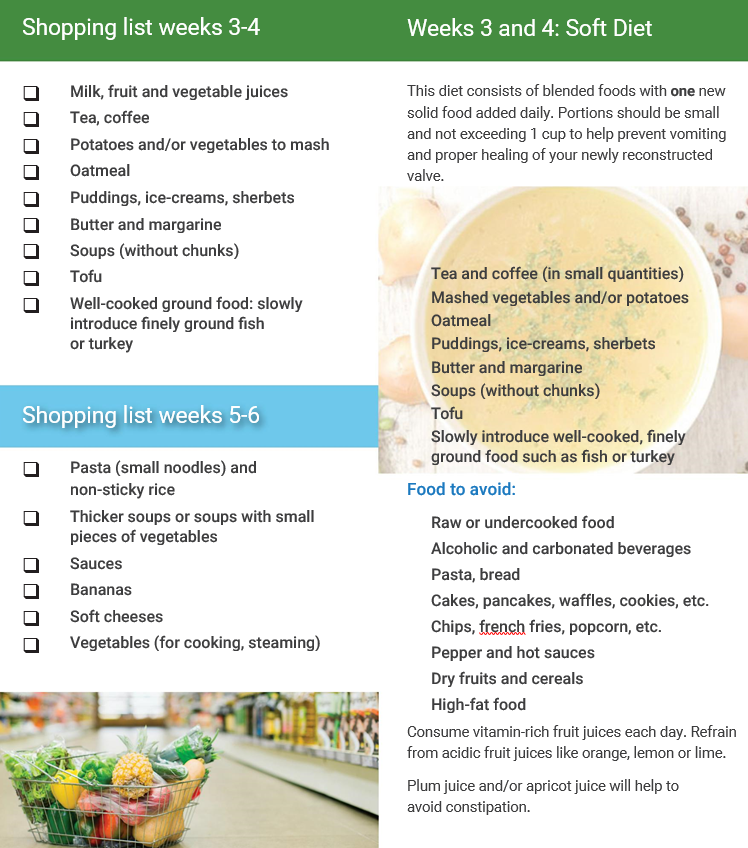

Depending on your tolerance level you may introduce:
- Overcooked pasta (small noodles) and non-sticky rice
- Thicker soups or soups with small pieces of vegetables
- Sauces
- Bananas
- Soft cheeses
- Cooked vegetables
- Meatless casseroles
Foods to avoid:
- Fibrous meats
- Fibrous vegetables
Eat seated, in a quiet place, without stress. Chew your food thoroughly. Eat slowly.
Avoid consuming large quantities of food. Avoid carbonated beverages or alcohol.
If you have a burning sensation after consuming a particular food, try to avoid it and mention it to your physician at your next visit.
A burning sensation could mean that your newly reconstructed valve is operating correctly. However, if your symptoms persist, contact your physician as soon as possible.
At the start of week 7 you can eat normal food. But try to continue eating small meals.
Physical Activity
Walking is permitted and encouraged after your procedure. Begin to walk short distances, at a slow pace, and with someone who can assist you in case you experience any residual weakness due to anesthesia. Gradually increase the distance and duration of your walks until you feel you are back to normal. You may also climb stairs, although do it slowly for the first few weeks to reduce the risk of increasing abdominal pressure.
In order to give your newly reconstructive valve time to heal and fuse, do not lift anything over 5 pounds for the first 2 weeks. During weeks 3-6, you may lift items up to 10 pounds. Beginning in week 7 lift items you normally would.
Sports and other interse exercise should be avoided for the first 6 weeks following your procedure. Then consult with your doctor to determine if you are ready to resume your normal exercise routine.
Driving may be resumed 1-2 days after the procedure. Do not drive if you are taking prescription pain medication, are experiencing fatigue, or are feeling sore.
Sex may be resumed after 7 days.
Medications
Your doctor will determine your need for acid-reducing medications following your procedure. Before leaving the hospital, your physician may prescribe pain medications. It is important that you take this medication as prescribed. If your pain is not well managed, contact your physician.
Follow Up
After the procedure, your doctor will see you to assess the effectiveness of the TIF procedure. Your doctor may also schedule additional follow-up appointments.
Most patients will be able to return to work 3-7 days after the procedure. You and your doctor should determine a timetable for returning to work based on a number of factors including residual fatigue for general anesthesia, any complications during the procedure, your overall medical condition, and your general need for recovery time.
